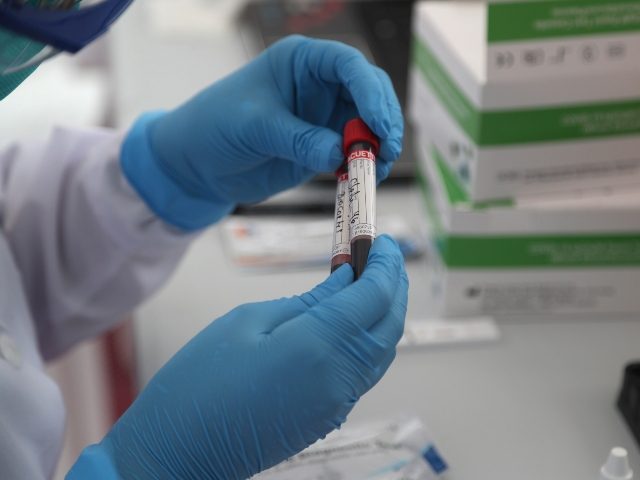Pakistani police arrested at least nine people on Thursday after a mob of over a dozen people broke into and vandalized a Chinese coronavirus ward at a Karachi hospital.
The attack occurred after a coronavirus patient treated there died and doctors refused to hand over his body to family, Pakistani newspaper Dawn reported.
Authorities at the Jinnah Postgraduate Medical Center (JPMC) in Karachi, Pakistan’s largest city, had denied the 60-year-old victim’s family access to the man after he was admitted as a patient in critical condition from the Chinese coronavirus days earlier.
After the man passed away on Thursday, a large mob of people gathered outside the JPMC before forcing its way into the hospital and raiding the isolation ward, according to the report. The mob managed to locate and remove the victim’s body from the hospital wing, where 37 Chinese coronavirus patients are currently being treated. The group took the victim’s body outside of the medical facility before being stopped by local law enforcement. The police arrested at least nine people following the attack on the public hospital and returned the body to the ward. Authorities say no one was injured in the raid.
“The mob broke the doors, glass windows, ceiling fans, tables, computers … everything they could lay their hands on,” JPMC Executive Director Dr. Seemin Jamali told Dawn.
Photos taken of the isolation ward following the raid show the reception desk’s glass window was shattered by the mob; Jamali confirmed that a receptionist was on shift at the time of the attack. In addition to the receptionist, at least eight doctors, eight nurses, two hospital attendants, two janitors, and various security staff were present at the ward when the mob attacked, according to the newspaper.
JPMC isolation ward attack
This is very disturbing that doctors who are taking care of everyone in this pandemic by risking their own life still they are not safe from people.
Lack of PPEs and security can cause huge loss for everyone. @SindhuSorath @SindhuWarsha pic.twitter.com/7Dks9kX7DX— Raaj Khatri (@raaajkhatri) May 14, 2020
The hospital director explained to Dawn the strict protocol followed by health authorities following the death of a coronavirus patient already in isolation at the special coronavirus ward.
“When a Covid-19 [Chinese coronavirus] patient dies, the hospital administration calls the district health officer, who arranges the ghusl [Islamic ritual purification] and burial with Edhi [Pakistani welfare organization] staff. They bury the body in a far-off graveyard,” Jamali said.
The JPMC chief said that the hospital may need to relax the stringent measures to prevent future upsets.
“I would suggest that we rethink this policy of not allowing the family to see the deceased. They are someone’s loved one. Give the family proper hazmat suits and let them wash the body and bury them,” she proposed.
“I would just request people not to ransack hospitals like this. Doctors are risking their lives to save yours…[this is] an emotionally challenging time for everyone,” Dr. Jamali added.
On May 9, Pakistan lifted its nationwide coronavirus lockdown, which started in late March. Prime Minister Imran Khan announced the lockdown’s end on the same day that Pakistan recorded its highest daily increase in new Chinese coronavirus cases. At the time, Pakistani doctors voiced concern that the action was premature and warned that the lifting of the lockdown amid a surge in coronavirus cases would cause the nation’s hospitals to be overwhelmed.
“We are concerned about pressure that will come on the hospitals,” Salman Kazmi, Pakistan’s Young Doctors’ Association secretary, told journalists when Khan announced the end of Pakistan’s lockdown. “It will definitely lead to an increase in the number of cases, the number of critical cases,” he added.
In March, hospitals in Karachi were inundated with hundreds of patients demonstrating “flu-like symptoms” who feared they had the Chinese coronavirus. In this instance as well, local doctors warned that Pakistan’s hospitals were not equipped with enough medical supplies and staff to properly treat and address the emerging coronavirus outbreak. Karachi doctors openly admitted to Dawn that the nation’s already “struggling healthcare system” was not equipped to take on a serious pandemic.
At press time on Friday, Pakistan had recorded 37,218 infections and 803 deaths from the Chinese coronavirus, although regional Pakistani authorities believe the country’s true number of coronavirus cases to be higher than reported. They cite the national government’s failure to adequately test for coronavirus and quarantine thousands of Islamic pilgrims who returned to Pakistan from Iran in recent months.

COMMENTS
Please let us know if you're having issues with commenting.